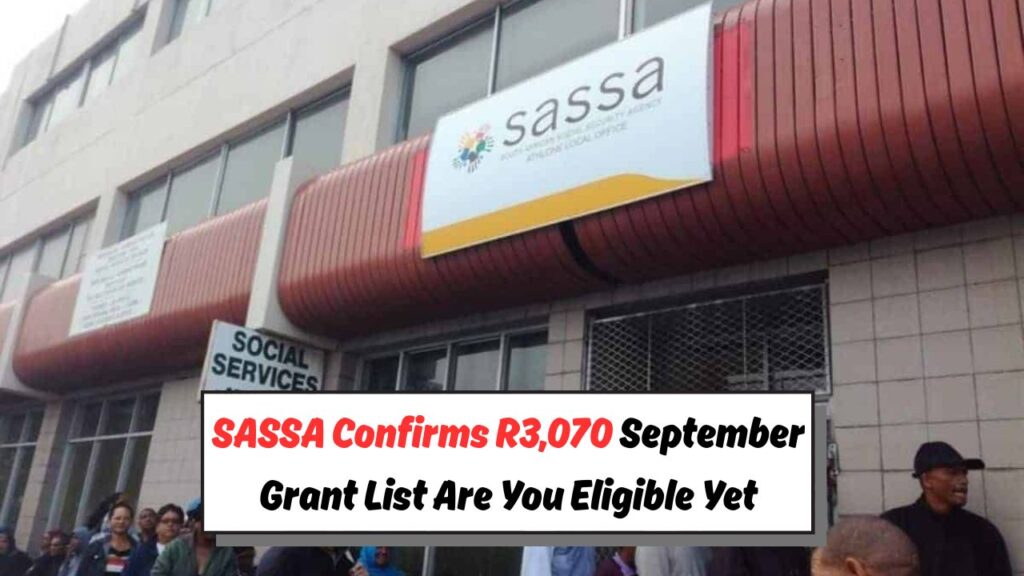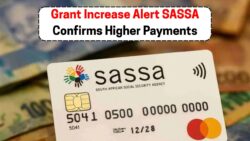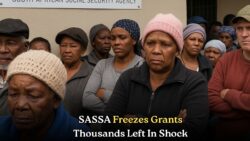Discover SASSA’s September R3,070 Grant Beneficiaries: The South African Social Security Agency (SASSA) has announced the list of beneficiaries for the September R3,070 grant. This significant financial support aims to aid various vulnerable groups across the country. With the ongoing economic challenges faced by many South Africans, these grants play a crucial role in providing much-needed relief. Beneficiaries include the elderly, individuals with disabilities, and families in dire financial straits. As the cost of living continues to rise, these grants ensure that basic needs such as food, healthcare, and shelter can be met.

Understanding the September R3,070 Grant Eligibility
The eligibility criteria for SASSA’s September R3,070 grant are designed to prioritize those most in need. Elderly citizens, identified as individuals aged 60 and above, form a significant portion of the recipients. This is due to the recognition of their limited earning potential and the increased costs associated with aging, such as healthcare. Additionally, individuals with disabilities are prioritized. This includes people with both physical and mental disabilities who are unable to work and require financial assistance to manage their daily living expenses. Families with children under the age of 18 also qualify, especially those facing extreme poverty. In these cases, the grant acts as a financial buffer that helps in providing essentials like education and nutrition, ensuring that children are not deprived of basic needs due to financial constraints. The application process for these grants involves thorough vetting to ensure that aid reaches the intended recipients efficiently.
Impact of SASSA’s Grant on South African Communities
The impact of SASSA’s R3,070 grant on South African communities is profound. For many families, this grant represents a lifeline, helping to alleviate the financial burden of everyday expenses. In impoverished communities, the grant can significantly improve living standards, enabling access to not only basic necessities but also opportunities for better education and healthcare. By injecting this financial aid into the economy, SASSA also supports local businesses. When beneficiaries spend their grants on local goods and services, it stimulates economic activity, creating a ripple effect that benefits entire communities. Furthermore, the grant fosters social stability by reducing the economic pressures that often lead to social unrest. Through these efforts, SASSA contributes to building a more equitable society, ensuring that even the most vulnerable have a chance to lead dignified lives.
How to Apply for SASSA’s R3,070 Grant
Applying for SASSA’s R3,070 grant involves a clear and streamlined process designed to ensure accessibility for all eligible applicants. Applicants must first gather necessary documentation, which typically includes proof of identity, residency, and income status. This documentation helps verify the applicant’s eligibility and ensures that the grant is directed to those who genuinely need it. The application can be submitted online via the SASSA website or in person at a local SASSA office. For those who choose to apply in person, it’s advisable to schedule an appointment to avoid long wait times. Once an application is submitted, it undergoes a thorough review process, during which SASSA officials assess the validity of the information provided. Successful applicants are notified and begin receiving their grants within a specified period. By making the application process straightforward and accessible, SASSA ensures that financial aid is available to those who need it most.
Common Challenges Faced by Grant Recipients
Despite the significant benefits that SASSA’s R3,070 grant provides, recipients often face challenges that can hinder their ability to fully capitalize on this support. One common issue is the delayed disbursement of funds, which can leave beneficiaries in a precarious position as they wait for the grant to arrive. This delay might be due to administrative bottlenecks or verification issues. Another challenge is the lack of financial literacy among some beneficiaries, which can lead to mismanagement of the grant money. To address this, SASSA has been working on initiatives to educate recipients about budgeting and financial planning, ensuring that the grant is used effectively to improve their quality of life. Additionally, logistical challenges, such as accessing SASSA offices or online platforms, can pose hurdles, particularly for those in remote areas. By recognizing and addressing these challenges, SASSA continues to refine its processes to ensure that the grant fulfills its intended purpose of providing vital support to South Africa’s most vulnerable populations.




